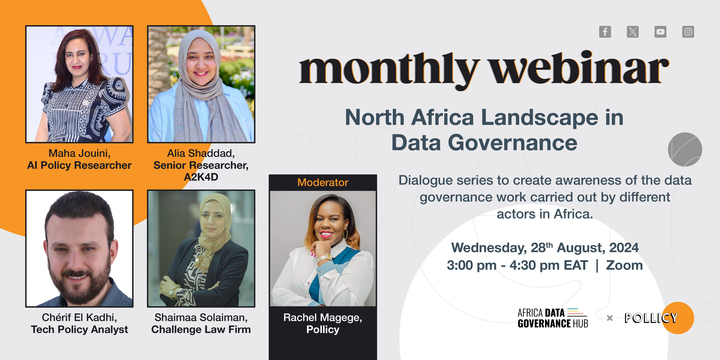North Africa's Data Governance Landscape: Key Insights from the August 2024 Webinar
2024-09-01
2024-09-01

On August 28th, 2024, Pollicy, “a feminist collective of technologists, data scientists, creatives and academics working at the intersection of data, design and technology to craft better life experiences by harnessing improved data,” hosted the Monthly Africa Data Governance Hub Webinar titled North Africa Landscape in Data Governance.
The event began with a warm welcome in both Swahili Kari Bosana and Arabic Al-Salam Alikom, showcasing the rich cultural diversity that defines Africa. The webinar brought together experts from across the continent to discuss the evolving landscape of data governance, highlighting the importance of collaboration, legal reform, and inclusive policies in navigating the challenges ahead. One thing was clear by the end of the webinar, the digital revolution is the next challenge that the African continent will need to navigate cautiously if we are to ensure that no one is left behind.
Rachel Magege, Programming Lead for Data Governance at Pollicy, moderated the session, guiding the conversation through the complexities of data governance in the region, recognizing the need to harness the transformative power of data and technology while ensuring that no one gets left behind.
At the beginning of the event, Phillip Ayazika, Director of Programs at Pollicy, posed the central question which would set the framework for the conversation: “How is the continent getting ready to implement inclusive data governance policies?” Yet with the rapid developments in data governance, the conversation is no longer simply about compliance and risk management, but also requires a holistic approach that is human centered, drives innovation, ensures data is managed responsibly, and that AI policies are responsible and inclusive of all citizens.
Artificial intelligence is revolutionizing a growing number of sectors, and Africa is rapidly adopting AI to address some of its critical challenges including poverty, disease, and food security. Noting that only 7 out of 54 (Benin, Egypt, Ghana, Mauritius, Rwanda, Senegal, and Tunisia) countries in Africa have developed national AI strategies or policies, Phillip advocated for the urgent need for African countries to collaborate on complementary data solutions that address shared challenges.
Data privacy and ethics were a central theme throughout the webinar. To kick off the conversation, Shaimaa Solaiman, Managing Partner at Challenge Law Firm, focused on the vital issue of data protection, particularly in the context of cross-border data transfers. She argued that “Establishing an international treaty that respects the laws of individual countries is essential for implementing effective data protection policies. We must align on both international and regional levels to ensure that data is translated efficiently and securely.” Solaiman’s contribution underscored the need for a unified approach to data governance, one that balances international cooperation with respect for national legal frameworks. She noted that new advancements are taken everyday across Africa to adopt data protection policies to protect citizens. She gave an example of the Child Data Protection Act (2024) that Egypt enacted to protect children’s data on gaming applications. Under this law, gaming platforms are prohibited from collecting, storing, or processing personal data from children without obtaining explicit consent from a parent or legal guardian. The legislation reflects Egypt's commitment to enhancing digital privacy and ensuring the safety of minors in the online environment.
Shifting the focus to the Middle East and North Africa, Alia Shaddad, Senior Researcher at the Access to Knowledge for Development Center & the MENA Observatory on Responsible AI, discussed the role of the Observatory as a platform for advancing responsible data and AI practices. Shaddad provided an overview of the common challenges facing Egypt, Tunisia, Palestine, Morocco, Jordan, and Lebanon, where the Observatory has cultivated partnerships with local think tanks. She shared insights from the center’s research, which focused on the challenges of data governance in the healthcare and food security sectors. She noted that across the board, all surveyed countries in research focused on food security face gaps in data quality, availability, and a lack of trust among farmers of AI technologies. Advocating for policy recommendations in the healthcare sector, Shaddad remarked that, “There are significant infrastructural gaps and a need for ethical data practices and capacity building among frontline healthcare professionals.” She hopefully noted that, “While digitization is costly and the necessary infrastructure is not fully in place, the conversations are starting to happen, and that is a positive step forward.”
As the discussion evolved, Chérif El Kadhi, a Tech Policy Analyst, emphasized the critical role of legal frameworks in safeguarding personal data. Kadhi made a strong argument about the need for governments to update legal frameworks and actually enforce them effectively.” He also highlighted that the success of this process will depend on the collective work of academics, researchers, policy makers, and advocates. He argued that academics should expand the focus of their advocacy to include ICT engineers and others involved in data handling. He noted that ”Cross-border collaboration is essential to ensure that personal data protection is upheld as a fundamental human right.”
The webinar concluded with a collective call to action, emphasizing the need for continued dialogue, collaboration, and concrete steps to address the challenges of data governance in North Africa. As these discussions progress, they will lay the groundwork for more resilient and inclusive data governance frameworks that support the region’s broader development goals. The insights shared during this event not only illuminated the current landscape but also pointed the way forward for stakeholders committed to advancing data governance in Africa.